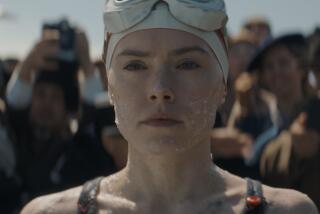Ordinary people, unusual moments
- Share via
IN 13 stories, Christopher Meeks probes relentlessly at the mundane and unexceptional: lives filled more with tedium and tragedy than happiness; lives in which encounters with good luck are few and far between. “The Middle-Aged Man & the Sea” still manages to honor those lives, treating them with the dignity and introspection they deserve.
Meeks, who teaches English at Santa Monica College and fiction writing in the UCLA Extension Program, is interested in studying the same kinds of characters in each story -- mostly middle-aged, unhappily married suburban couples. Though he is less successful at delving into the minds of his female characters, the men who populate these stories are deeply authentic and familiar in their sadness.
In “Academy Award Afternoon & Evening,” the author explores suburban malaise and the inevitable envy brought about by keeping up with the neighbors. An unnamed married couple are invited to the home of their friends Lila and Dave to watch the Academy Awards, which the protagonist decides is clearly “a mini-party to use their big-screen TV one last time before they sell the thing.”
As he and his wife arrive, they immediately notice their friends’ new Mercedes, which “looks like an ad: silver body, chrome wheels, moon roof, sparkling on the red brick driveway under a sun that also shines across town on movie stars and next to a lawn so perfect and green you want to open up his trunk, pull out a golf club, and hit a ball so hard and imperfectly it leaves a divot the size of Texas on what otherwise is an emerald carpet.” Although the afternoon begins with pleasantries and superficial chatter, it builds to uncomfortable silence and awkwardness among friends, suggested by those opening images.
Marriage and being happy, according to many of the stories in this collection, are mutually exclusive. In “Green River,” a family’s car trip to Utah brims with resentment and tension. The protagonist reflects that “one day, you’re young, laughing, eating Cheerios, the next, you’re locked in a car with your wife and 11-year-old son, no one’s talking to each other, the acidity of anger drip drip dripping at your insides if not your wife’s.” When the man tells his son, Harry, “Be happy for the small things,” the advice seems intended just as much for himself.
In fact, this idea resonates throughout the collection: Meeks’ characters seek happiness in the small things because they have no choice -- aside from the minor pleasures they occasionally stumble upon, contentment is absent from their lives. In “Nike Had Nothing to Do With It,” a man tries to drain the anger of his failed relationship by jogging and finds solace in the beauty of nature around him: “He breathed deeply the smell of the cut grass. He loved that. A bird called above him, and he looked up and saw a swath of blue landing on a limb. He was a man with luck.”
In the book’s powerful title story, Meeks uses a fishing trip to explore the unexpected bonds between two men. The mundane outing gives them a chance to share the truths about their marriages, and -- when one reveals he is dying of cancer -- to appreciate the importance of living in the moment.
Though a few of the briefer stories in this book are unremarkable, most are poignant and wise, sympathetic to the everyday struggles these characters face. They are also filled with aphoristic revelations: “Our lives turn on the stupidest things,” reflects the protagonist of “The Rotary,” searching through his family history to understand where he has ended up. When his wife announces one day that she is leaving him, he notes, “Marriages are like oil derricks and motorboats; when they don’t work, they’re abandoned.”
No matter how difficult or heavy the burden depicted, these stories end on a note of resilience. Meeks’ characters might feel melancholy and trapped in their lives, but the reader senses that they refuse to give up, always hoping the next day will bring something better.
*
Carmela Ciuraru is a regular contributor to Book Review and the editor of six anthologies of poetry, including “Beat Poets” and “Solitude.”
More to Read
Sign up for our Book Club newsletter
Get the latest news, events and more from the Los Angeles Times Book Club, and help us get L.A. reading and talking.
You may occasionally receive promotional content from the Los Angeles Times.








